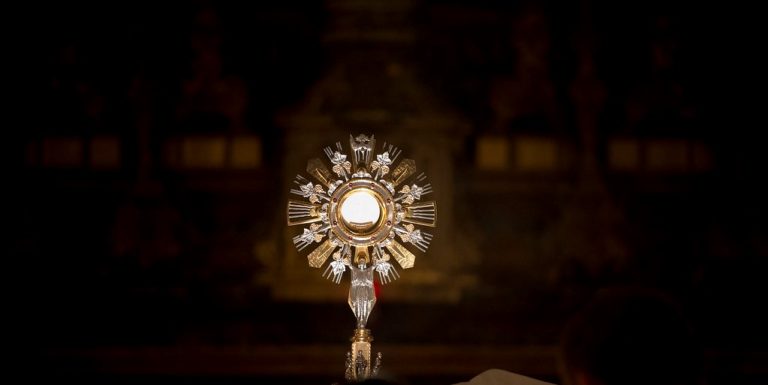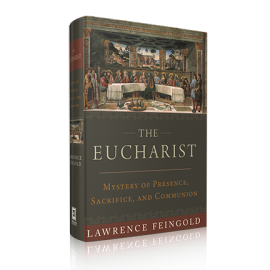By Lawrence Feingold
Dr. Lawrence Feingold is Associate Professor of Theology and Philosophy at Kenrick-Glennon Seminary in St. Louis. He is the author of numerous scholarly books, including The Eucharist: Mystery of Presence, Sacrifice, and Communion, a comprehensive commentary on the mystery of the Eucharist drawing from Scripture, the Church Fathers, and magisterial teaching throughout the ages.

Eucharistic Prayers, in the epiclesis for the sanctification of the faithful, frequently mention the forgiveness of sins as a primary effect of Communion. This is interpreted by Innocent III to mean that devout reception of the Eucharist “blots out venial sins and wards off mortal sins.” Both effects are made possible by the infusion of charity. This does not mean, of course, that all mortal sins are effectively warded off, nor that all venial sins are actually forgiven, for the infusion of charity is according to the measure of the disposition of the communicant and both effects require our free and active cooperation.
The forgiveness of venial sins through reception of Holy Communion comes through an infusion of charity that attracts the soul to further conformity with the will of God, leading it to repent (at least implicitly) for certain habits of venial sin that it sees to be contrary to God’s will and to make a purpose of amendment in that regard. Venial sins will be forgiven to the degree that there is a movement of true contrition for them that includes a resolve to avoid those sins in the future.
Experience shows that contrition for one venial sin does not have to include contrition for other venial sins, for we can resolve to combat some venial sins without making the resolve to eliminate others. That is, we can remain attached to some venial sins while sincerely repenting of others. Mortal sins, on the other hand, are always forgiven together, because, unlike venial sins, they all involve a turning away from God as our final end. The infusion of charity requires that all of them be repudiated, for all are directly and gravely contrary to love for God above all. Venial sins, on the contrary, do not imply that the soul makes something else other than God into its final end, and thus they are not opposed to the very existence of charity, as mortal sin is, but rather to its fervor and perfection.
Thus an infusion of charity increases the fervor of the will and freely attracts it to combat, at least in part, what is opposed to the perfection of charity. St. Thomas says: “Venial sins, although not opposed to the habit of charity, are nevertheless opposed to the fervor of its act, which act is kindled by this sacrament; by reason of which act venial sins are blotted out.” Future sins are also warded off by an increase of charity, which is the best defense against all temptations and all the attacks of the enemy and of our disordered inclinations. The Eucharist gives us the spiritual power to ward off any mortal sin, which causes the death of the soul.
Although worthy reception of the Eucharist gives us the means to ward off future sin, it does not automatically achieve that effect because our free will during this earthly life is not yet fully confirmed in good, as is the case of the blessed who see God. The Eucharist gives us the grace to avoid all grave sin or even deliberate venial sin, but our will can still resist that grace if we so choose.
By nourishing us with charity, Holy Communion also gives strength to resist the temptations of the enemy. This effect is indicated in the fourth-century Eucharistic Prayer in the Apostolic Constitutions, in which the priest prays that those who partake of the sacrifice “be delivered from the devil and his deceit.”
You Might Also Like
 The Eucharist: Mystery of Presence, Sacrifice, and Communion explores the three ends of the Sacrament of Sacraments: God’s true presence, His redemptive sacrifice, and spiritual nourishment through communion with Him. In this follow-up to his groundbreaking work, Faith Comes From What Is Heard, Lawrence Feingold constructs a biblical vision of the Eucharist from its prefigurement in the Old Testament to its fulfillment in the New and presents the Eucharistic theology of the Church Fathers, St. Thomas Aquinas, and magisterial teaching from centuries past through today.
The Eucharist: Mystery of Presence, Sacrifice, and Communion explores the three ends of the Sacrament of Sacraments: God’s true presence, His redemptive sacrifice, and spiritual nourishment through communion with Him. In this follow-up to his groundbreaking work, Faith Comes From What Is Heard, Lawrence Feingold constructs a biblical vision of the Eucharist from its prefigurement in the Old Testament to its fulfillment in the New and presents the Eucharistic theology of the Church Fathers, St. Thomas Aquinas, and magisterial teaching from centuries past through today.

